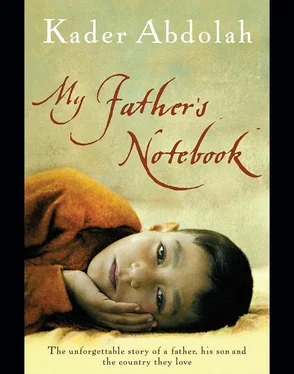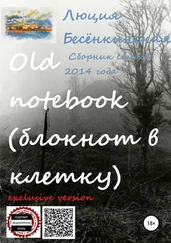“But it can’t.”
“Yes, they know that, but they’re imagining it can.”
“What does ‘imagining’ mean?”
“Just thinking. In their minds they see the iron bird sitting in the tree.”
Aga Akbar knew that when his mother couldn’t explain something, he should stop asking questions and simply accept it.
One day, when he was six or seven, his mother hid behind a tree and pointed to a man on a horse — a nobleman with a rifle slung over his shoulder.
“That’s your father.”
“Him?”
“Yes. He’s your father.”
“Then why doesn’t he come home?”
Using their simple sign language, she placed a crown on her head, stuck out her chest, and said, “He’s an aristocrat, a man of noble birth. A scholar. He has many books and a quill pen. He writes.”
Aga Akbar’s mother, Hajar, had been a servant in the nobleman’s palace, where he lived with his wife and eleven children. He could see that Hajar was different, however, so he took her to his house on Lalehzar Mountain, where he kept his books and worked in his study.
She was the one who tidied the study, dusted the books, filled the inkpot and cleaned the quills. She cooked his lunch and made sure he had enough tobacco. She washed his coat and suit, and polished his shoes. When he had to go out, she handed him his hat and held the horse’s reins until he was in the saddle.
“Hajar!” he called one day from his desk in the study, where he was writing.
“Yes, sire?”
“Bring me a glass of tea. I’d like to have a word with you.”
She brought him a glass of tea on a silver tray. (That very same tray can still be seen on the mantel in the house of Aga Akbar’s wife.)
“Sit down, Hajar,” he said.
She continued to stand.
“Come now, Hajar, I’ve given you permission to sit, so take a seat.”
She sat on the edge of a chair.
“I have a question for you, Hajar. Is there a man in your life?”
She didn’t reply.
“Answer me. I asked you if there was a man in your life.”
“No, sire.”
“I’d like you to be my sigeh wife. Would you like that?”
It was an unexpected question.
“That’s not for me to say, sire,” she replied. “You’ll have to ask my father.”
“I’ll ask your father in due course. But first I’d like to know what you think of the idea.”
She thought for a moment, with her head bowed. Then she said clearly, “Yes, sire, I would.”
That same evening, Hajar’s father was taken to the nobleman’s study by the village imam, who recited a short sura from the Holy Book and said, “ Ankahtu wa zawagtu ,” declaring Hajar to be the wife of Aga Hadi Mahmud Ghaznavi Khorasani.
Next the imam explained to her that she was allowed to have children, but that they couldn’t have their father’s name. Nor would they be able to inherit anything. Hajar’s father was given an almond grove, the profits of which were to be shared with Hajar: one half for him, the other half for Hajar and any children she might bear. When her father died, the entire grove would belong to Hajar and her children.
Ten minutes later her father and the imam left. Hajar stayed.
She was wearing a blue-green dress that she’d inherited from her mother.
Early in the morning she’d gone to the village bathhouse and furtively removed her body hair. Then she’d dipped her toes in henna and her fingertips in the sap of the runas —a wild, reddish-purple flower — until it had dyed her fingers red.
“I’ll be spending the night here, Hajar,” the nobleman announced.
She made up the bed.
Then Aga Hadi Khorasani slipped into the bed beside her, and she received him.
• • •
Hajar had seven children. Aga Akbar, the youngest, was born a deaf-mute.
She noticed it before he was even a month old. Though she saw that he didn’t react normally, she didn’t want to believe it. She kept him with her at all times, allowing others to see him only briefly. This went on for six months. Everyone realised that the baby was deaf, but nobody dared to say anything. Finally Kazem Khan, Hajar’s oldest brother, decided that it was time to broach the subject. Kazem Khan, an unmarried man who rode through the mountains on horseback, was a poet. Though he lived by himself on a hill above the village, there were always women in his life. The villagers saw a succession of women silhouetted against his lighted window.
Nobody knew what he did or where he went on his horse.
When there was light in his house, people knew he was home. “The poet is at home,” they then said to each other.
Nothing else was known about him. Yet when the village needed him, he was always ready to lend a helping hand. At such moments he was the voice of the village. If a flash flood suddenly turned the dry riverbed into a raging torrent and their houses filled with water, he immediately appeared on his horse and diverted the flow. If a number of children unexpectedly died and the other mothers feared for their children’s lives, he galloped up on his horse with the doctor in tow. And all the village brides and grooms considered it an honor to have him as a guest at their wedding feast.
This same Kazem Khan rode his horse into the courtyard of Hajar’s house and stopped in the shade of an old tree. “Hajar! My sister!” he called, still in the saddle.
She opened the window.
“Welcome, brother. Why don’t you come in?”
“Could you come to my house tonight? I’d like to talk to you. Bring the baby with you.”
Hajar knew he wanted to talk to her about her son. She realised she would no longer be able to hide her baby.
As evening fell, Hajar strapped her baby to her back and climbed the hill to the house that the villagers referred to as “a gem that had fallen among the walnut trees”.
Kazem Khan smoked opium, a generally accepted practice in those days. It was even considered a sign of his poetic nobleness.
He had lit the coals in the brazier, laid his pipe in the warm ashes and put the thin slices of brownish-yellow opium on a plate. The samovar was bubbling.
“Sit down, Hajar. You can warm up your dinner in a moment. Let me hold the baby. What’s his name? Akbar? Aga Akbar?”
She reluctantly handed the baby to her brother.
“How old is he? Seven or eight months? Go ahead and eat your dinner. I’d like some time alone with him.”
Hajar felt a great weight bearing down on her. She couldn’t eat. Instead, she burst into tears.
“Come now, Hajar, there’s no need to cry. Don’t feel so sorry for yourself. If you hide the baby, if you give up on him, you’ll just make him backward. For the last six or seven months, he’s seen nothing, done nothing, had no real contact with the world. Everywhere I go in the mountains, I see children who are deaf and dumb. You have to let people talk to him. All you need is a language, a sign language that we can invent ourselves. I’ll help you. Starting tomorrow, let other people take care of him too. Let everyone try to communicate with him in his or her own way.”
Hajar carried her child into the kitchen and again burst into tears. This time tears of relief.
Later, after Kazem Khan had smoked a few opium pipes and was feeling cheerful and light, he came in and sat down beside her.
“Listen, Hajar. I don’t know why, but I have the feeling I should play a role in this child’s life. I didn’t feel this way about your other children, mostly because they were fathered by that nobleman, and I don’t want to have anything to do with him. But before you leave, we need to talk about him and about your baby’s future. It’s high time that nobleman learned that Akbar has an uncle.”
Читать дальше












